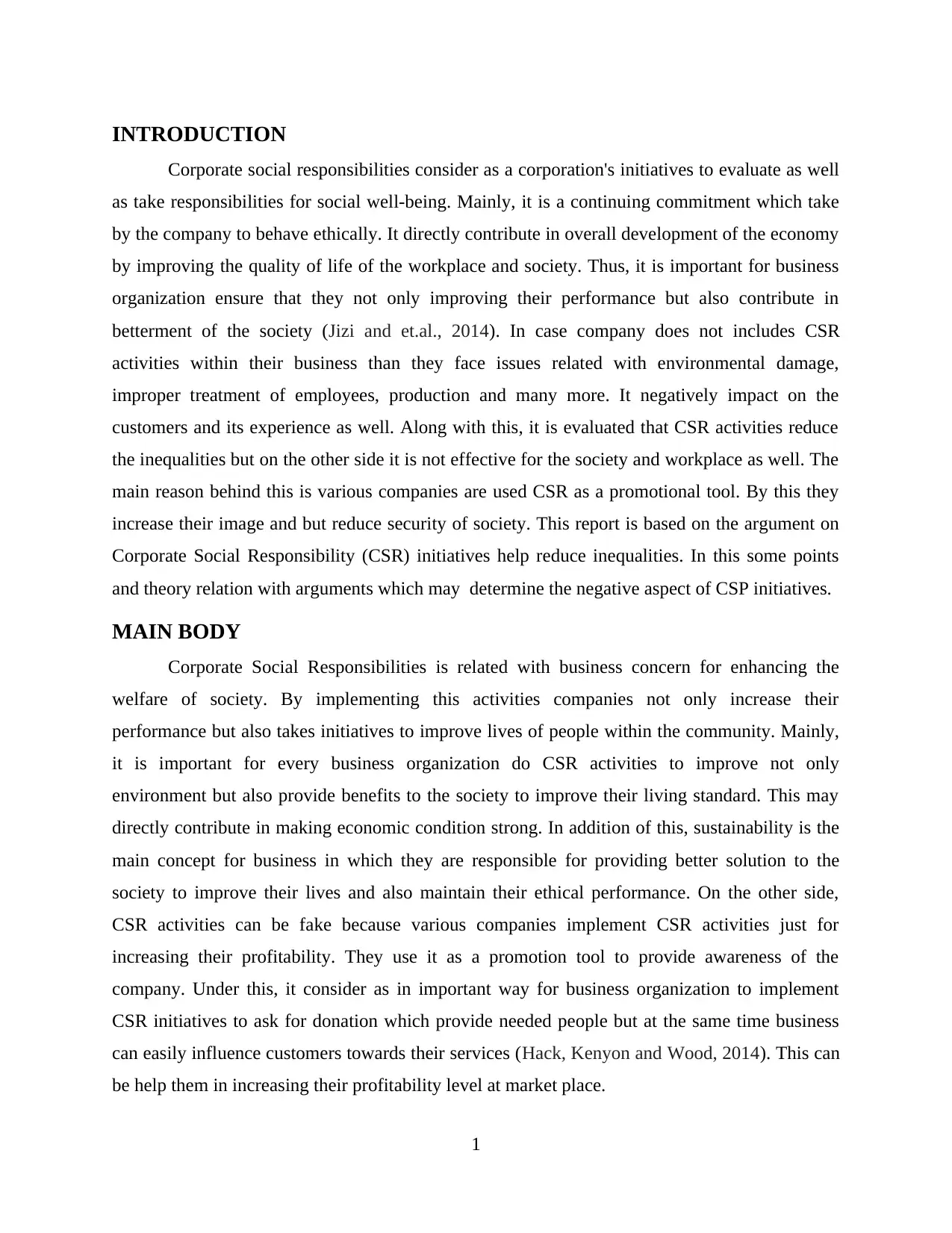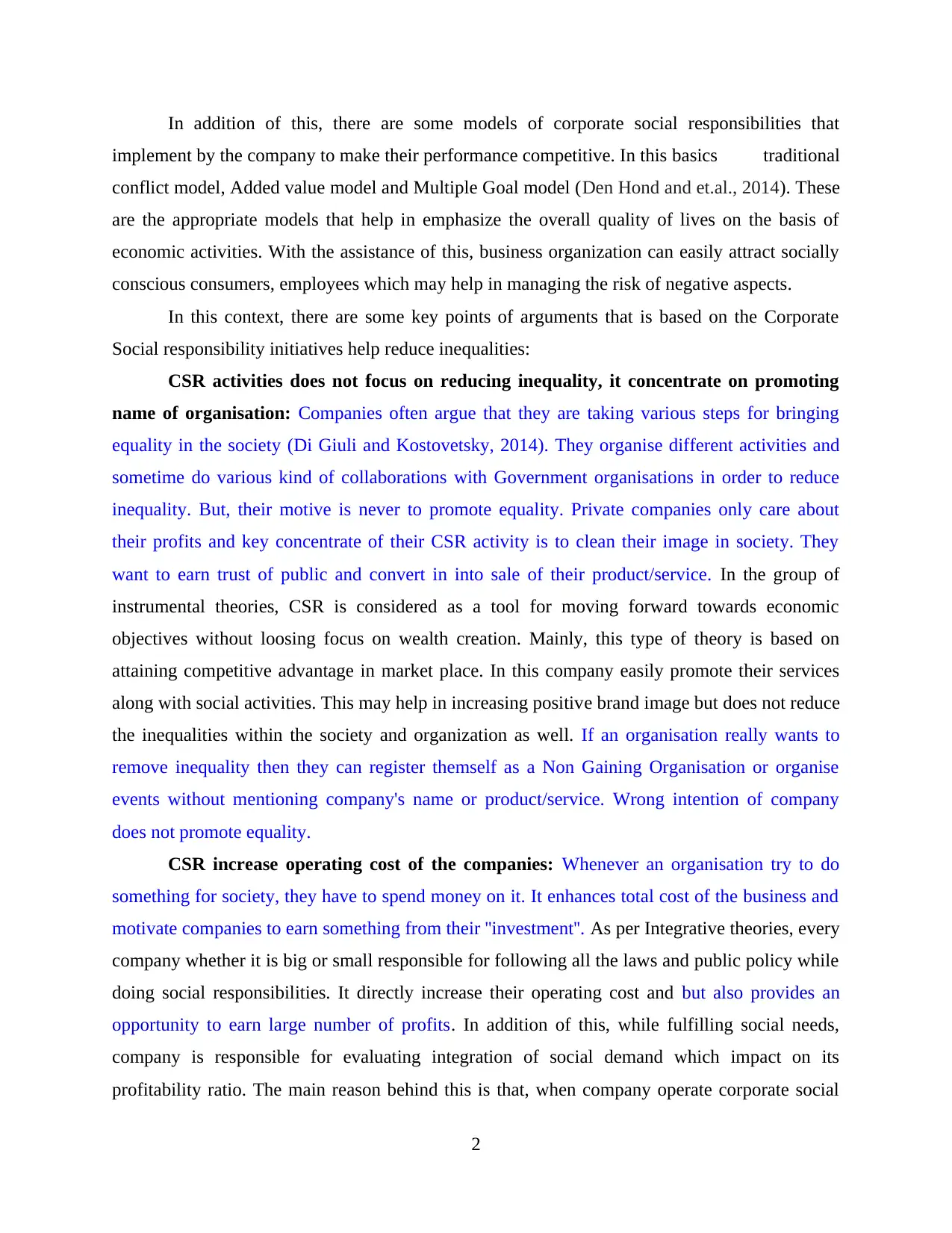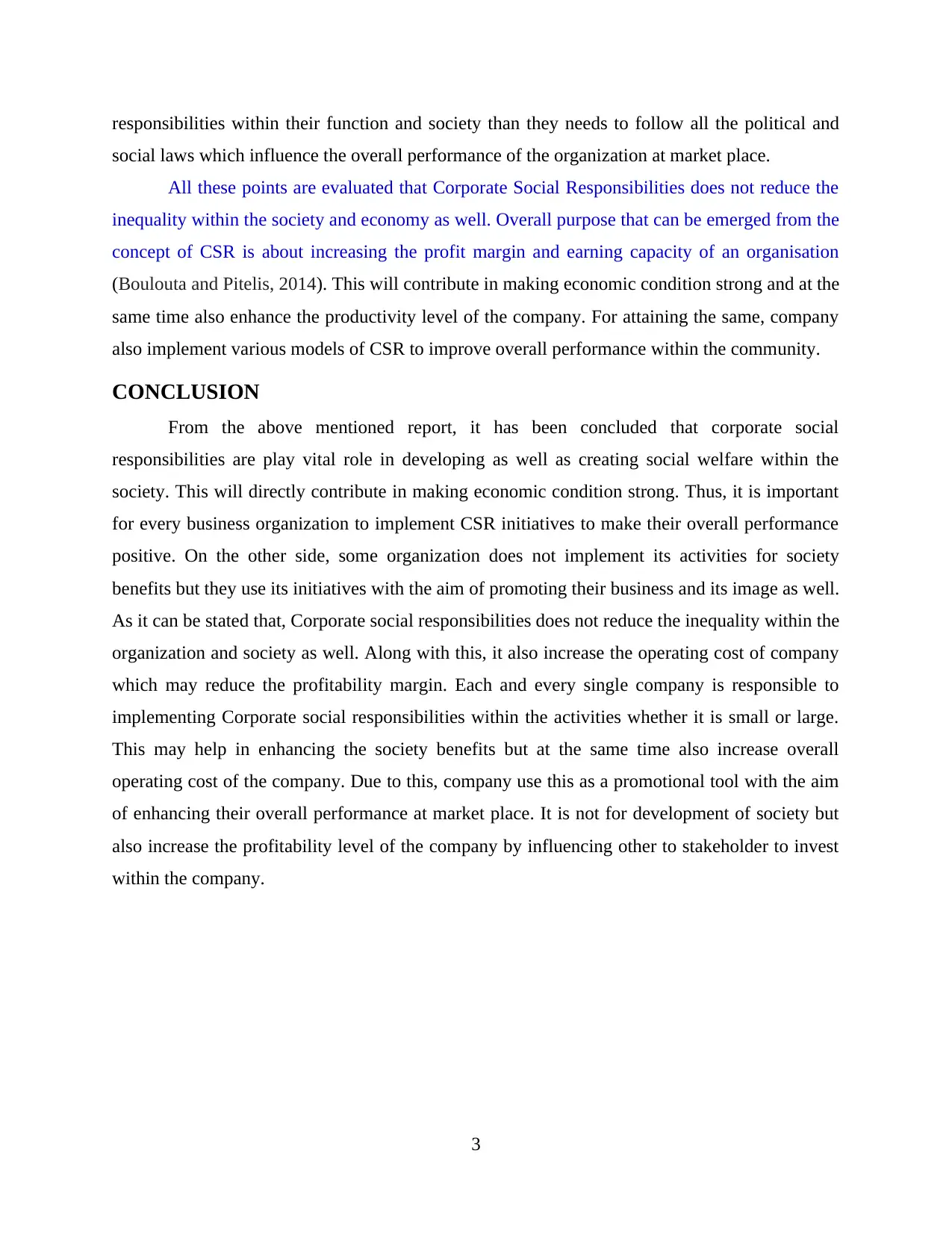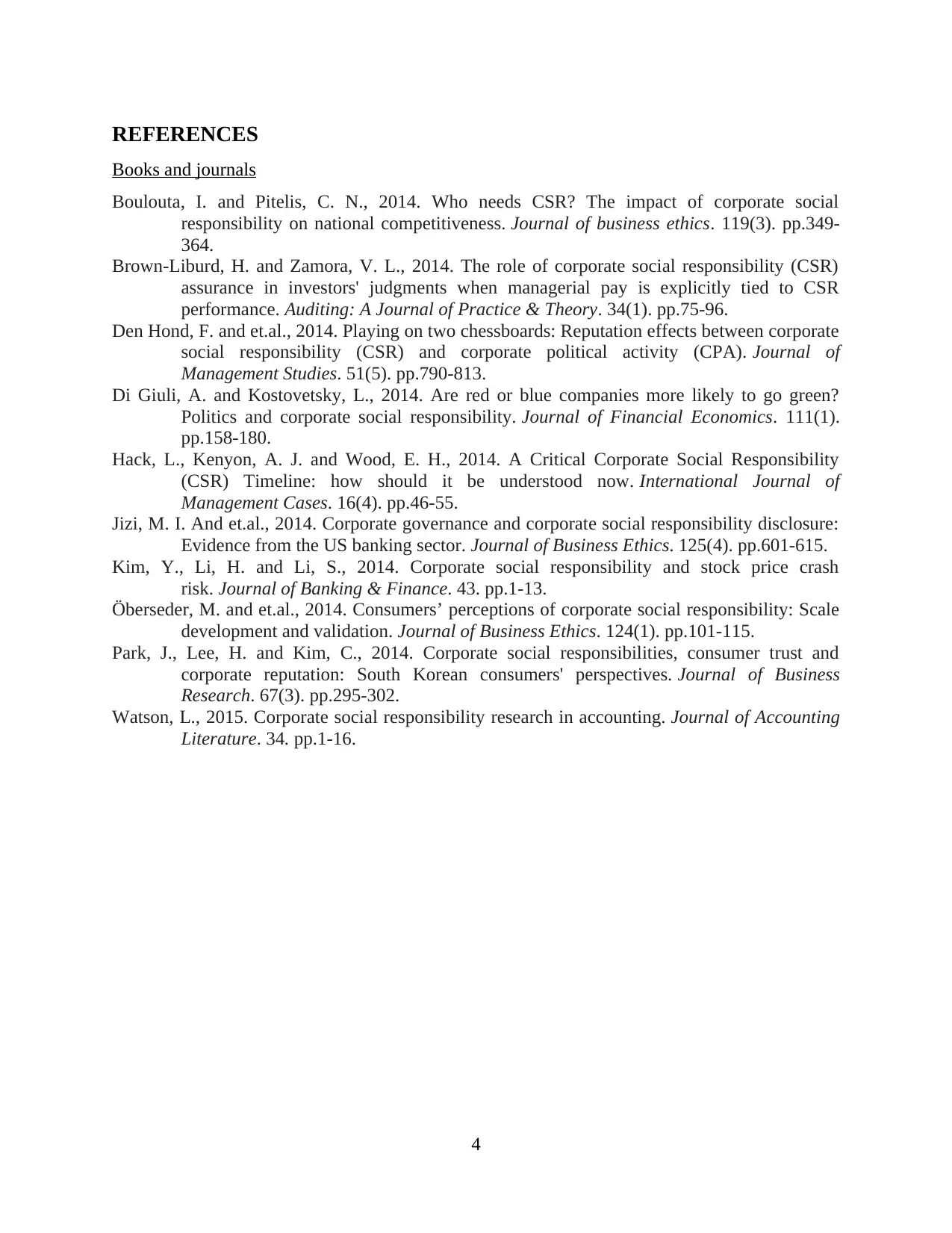Debate on Corporate Social Responsibility Initiatives and Inequality
VerifiedAdded on 2020/11/12
|7
|1669
|102
Essay
AI Summary
This essay presents a debate on Corporate Social Responsibility (CSR) and its impact on reducing inequalities. The introduction defines CSR and its role in societal well-being, highlighting potential issues if companies fail to integrate CSR. The main body explores arguments both for and against the motion that CSR initiatives reduce inequalities. It discusses how CSR can be used for promotional purposes, potentially increasing a company's image rather than genuinely addressing inequalities. The essay examines various CSR models and presents key arguments, such as CSR not focusing on reducing inequality but promoting the organization's name, and the increased operating costs associated with CSR activities. The conclusion summarizes the arguments, stating that while CSR plays a vital role in social welfare, it may not always effectively reduce inequality, and can sometimes serve as a promotional tool. The essay concludes that CSR activities do not always help in reducing inequality and can increase operational costs.

Debate on against the
motion
motion
Paraphrase This Document
Need a fresh take? Get an instant paraphrase of this document with our AI Paraphraser

Table of Contents
INTRODUCTION...........................................................................................................................1
MAIN BODY...................................................................................................................................1
CONCLUSION................................................................................................................................3
REFERENCES................................................................................................................................5
.........................................................................................................................................................5
INTRODUCTION...........................................................................................................................1
MAIN BODY...................................................................................................................................1
CONCLUSION................................................................................................................................3
REFERENCES................................................................................................................................5
.........................................................................................................................................................5

⊘ This is a preview!⊘
Do you want full access?
Subscribe today to unlock all pages.

Trusted by 1+ million students worldwide

INTRODUCTION
Corporate social responsibilities consider as a corporation's initiatives to evaluate as well
as take responsibilities for social well-being. Mainly, it is a continuing commitment which take
by the company to behave ethically. It directly contribute in overall development of the economy
by improving the quality of life of the workplace and society. Thus, it is important for business
organization ensure that they not only improving their performance but also contribute in
betterment of the society (Jizi and et.al., 2014). In case company does not includes CSR
activities within their business than they face issues related with environmental damage,
improper treatment of employees, production and many more. It negatively impact on the
customers and its experience as well. Along with this, it is evaluated that CSR activities reduce
the inequalities but on the other side it is not effective for the society and workplace as well. The
main reason behind this is various companies are used CSR as a promotional tool. By this they
increase their image and but reduce security of society. This report is based on the argument on
Corporate Social Responsibility (CSR) initiatives help reduce inequalities. In this some points
and theory relation with arguments which may determine the negative aspect of CSP initiatives.
MAIN BODY
Corporate Social Responsibilities is related with business concern for enhancing the
welfare of society. By implementing this activities companies not only increase their
performance but also takes initiatives to improve lives of people within the community. Mainly,
it is important for every business organization do CSR activities to improve not only
environment but also provide benefits to the society to improve their living standard. This may
directly contribute in making economic condition strong. In addition of this, sustainability is the
main concept for business in which they are responsible for providing better solution to the
society to improve their lives and also maintain their ethical performance. On the other side,
CSR activities can be fake because various companies implement CSR activities just for
increasing their profitability. They use it as a promotion tool to provide awareness of the
company. Under this, it consider as in important way for business organization to implement
CSR initiatives to ask for donation which provide needed people but at the same time business
can easily influence customers towards their services (Hack, Kenyon and Wood, 2014). This can
be help them in increasing their profitability level at market place.
1
Corporate social responsibilities consider as a corporation's initiatives to evaluate as well
as take responsibilities for social well-being. Mainly, it is a continuing commitment which take
by the company to behave ethically. It directly contribute in overall development of the economy
by improving the quality of life of the workplace and society. Thus, it is important for business
organization ensure that they not only improving their performance but also contribute in
betterment of the society (Jizi and et.al., 2014). In case company does not includes CSR
activities within their business than they face issues related with environmental damage,
improper treatment of employees, production and many more. It negatively impact on the
customers and its experience as well. Along with this, it is evaluated that CSR activities reduce
the inequalities but on the other side it is not effective for the society and workplace as well. The
main reason behind this is various companies are used CSR as a promotional tool. By this they
increase their image and but reduce security of society. This report is based on the argument on
Corporate Social Responsibility (CSR) initiatives help reduce inequalities. In this some points
and theory relation with arguments which may determine the negative aspect of CSP initiatives.
MAIN BODY
Corporate Social Responsibilities is related with business concern for enhancing the
welfare of society. By implementing this activities companies not only increase their
performance but also takes initiatives to improve lives of people within the community. Mainly,
it is important for every business organization do CSR activities to improve not only
environment but also provide benefits to the society to improve their living standard. This may
directly contribute in making economic condition strong. In addition of this, sustainability is the
main concept for business in which they are responsible for providing better solution to the
society to improve their lives and also maintain their ethical performance. On the other side,
CSR activities can be fake because various companies implement CSR activities just for
increasing their profitability. They use it as a promotion tool to provide awareness of the
company. Under this, it consider as in important way for business organization to implement
CSR initiatives to ask for donation which provide needed people but at the same time business
can easily influence customers towards their services (Hack, Kenyon and Wood, 2014). This can
be help them in increasing their profitability level at market place.
1
Paraphrase This Document
Need a fresh take? Get an instant paraphrase of this document with our AI Paraphraser

In addition of this, there are some models of corporate social responsibilities that
implement by the company to make their performance competitive. In this basics traditional
conflict model, Added value model and Multiple Goal model (Den Hond and et.al., 2014). These
are the appropriate models that help in emphasize the overall quality of lives on the basis of
economic activities. With the assistance of this, business organization can easily attract socially
conscious consumers, employees which may help in managing the risk of negative aspects.
In this context, there are some key points of arguments that is based on the Corporate
Social responsibility initiatives help reduce inequalities:
CSR activities does not focus on reducing inequality, it concentrate on promoting
name of organisation: Companies often argue that they are taking various steps for bringing
equality in the society (Di Giuli and Kostovetsky, 2014). They organise different activities and
sometime do various kind of collaborations with Government organisations in order to reduce
inequality. But, their motive is never to promote equality. Private companies only care about
their profits and key concentrate of their CSR activity is to clean their image in society. They
want to earn trust of public and convert in into sale of their product/service. In the group of
instrumental theories, CSR is considered as a tool for moving forward towards economic
objectives without loosing focus on wealth creation. Mainly, this type of theory is based on
attaining competitive advantage in market place. In this company easily promote their services
along with social activities. This may help in increasing positive brand image but does not reduce
the inequalities within the society and organization as well. If an organisation really wants to
remove inequality then they can register themself as a Non Gaining Organisation or organise
events without mentioning company's name or product/service. Wrong intention of company
does not promote equality.
CSR increase operating cost of the companies: Whenever an organisation try to do
something for society, they have to spend money on it. It enhances total cost of the business and
motivate companies to earn something from their ''investment''. As per Integrative theories, every
company whether it is big or small responsible for following all the laws and public policy while
doing social responsibilities. It directly increase their operating cost and but also provides an
opportunity to earn large number of profits. In addition of this, while fulfilling social needs,
company is responsible for evaluating integration of social demand which impact on its
profitability ratio. The main reason behind this is that, when company operate corporate social
2
implement by the company to make their performance competitive. In this basics traditional
conflict model, Added value model and Multiple Goal model (Den Hond and et.al., 2014). These
are the appropriate models that help in emphasize the overall quality of lives on the basis of
economic activities. With the assistance of this, business organization can easily attract socially
conscious consumers, employees which may help in managing the risk of negative aspects.
In this context, there are some key points of arguments that is based on the Corporate
Social responsibility initiatives help reduce inequalities:
CSR activities does not focus on reducing inequality, it concentrate on promoting
name of organisation: Companies often argue that they are taking various steps for bringing
equality in the society (Di Giuli and Kostovetsky, 2014). They organise different activities and
sometime do various kind of collaborations with Government organisations in order to reduce
inequality. But, their motive is never to promote equality. Private companies only care about
their profits and key concentrate of their CSR activity is to clean their image in society. They
want to earn trust of public and convert in into sale of their product/service. In the group of
instrumental theories, CSR is considered as a tool for moving forward towards economic
objectives without loosing focus on wealth creation. Mainly, this type of theory is based on
attaining competitive advantage in market place. In this company easily promote their services
along with social activities. This may help in increasing positive brand image but does not reduce
the inequalities within the society and organization as well. If an organisation really wants to
remove inequality then they can register themself as a Non Gaining Organisation or organise
events without mentioning company's name or product/service. Wrong intention of company
does not promote equality.
CSR increase operating cost of the companies: Whenever an organisation try to do
something for society, they have to spend money on it. It enhances total cost of the business and
motivate companies to earn something from their ''investment''. As per Integrative theories, every
company whether it is big or small responsible for following all the laws and public policy while
doing social responsibilities. It directly increase their operating cost and but also provides an
opportunity to earn large number of profits. In addition of this, while fulfilling social needs,
company is responsible for evaluating integration of social demand which impact on its
profitability ratio. The main reason behind this is that, when company operate corporate social
2

responsibilities within their function and society than they needs to follow all the political and
social laws which influence the overall performance of the organization at market place.
All these points are evaluated that Corporate Social Responsibilities does not reduce the
inequality within the society and economy as well. Overall purpose that can be emerged from the
concept of CSR is about increasing the profit margin and earning capacity of an organisation
(Boulouta and Pitelis, 2014). This will contribute in making economic condition strong and at the
same time also enhance the productivity level of the company. For attaining the same, company
also implement various models of CSR to improve overall performance within the community.
CONCLUSION
From the above mentioned report, it has been concluded that corporate social
responsibilities are play vital role in developing as well as creating social welfare within the
society. This will directly contribute in making economic condition strong. Thus, it is important
for every business organization to implement CSR initiatives to make their overall performance
positive. On the other side, some organization does not implement its activities for society
benefits but they use its initiatives with the aim of promoting their business and its image as well.
As it can be stated that, Corporate social responsibilities does not reduce the inequality within the
organization and society as well. Along with this, it also increase the operating cost of company
which may reduce the profitability margin. Each and every single company is responsible to
implementing Corporate social responsibilities within the activities whether it is small or large.
This may help in enhancing the society benefits but at the same time also increase overall
operating cost of the company. Due to this, company use this as a promotional tool with the aim
of enhancing their overall performance at market place. It is not for development of society but
also increase the profitability level of the company by influencing other to stakeholder to invest
within the company.
3
social laws which influence the overall performance of the organization at market place.
All these points are evaluated that Corporate Social Responsibilities does not reduce the
inequality within the society and economy as well. Overall purpose that can be emerged from the
concept of CSR is about increasing the profit margin and earning capacity of an organisation
(Boulouta and Pitelis, 2014). This will contribute in making economic condition strong and at the
same time also enhance the productivity level of the company. For attaining the same, company
also implement various models of CSR to improve overall performance within the community.
CONCLUSION
From the above mentioned report, it has been concluded that corporate social
responsibilities are play vital role in developing as well as creating social welfare within the
society. This will directly contribute in making economic condition strong. Thus, it is important
for every business organization to implement CSR initiatives to make their overall performance
positive. On the other side, some organization does not implement its activities for society
benefits but they use its initiatives with the aim of promoting their business and its image as well.
As it can be stated that, Corporate social responsibilities does not reduce the inequality within the
organization and society as well. Along with this, it also increase the operating cost of company
which may reduce the profitability margin. Each and every single company is responsible to
implementing Corporate social responsibilities within the activities whether it is small or large.
This may help in enhancing the society benefits but at the same time also increase overall
operating cost of the company. Due to this, company use this as a promotional tool with the aim
of enhancing their overall performance at market place. It is not for development of society but
also increase the profitability level of the company by influencing other to stakeholder to invest
within the company.
3
⊘ This is a preview!⊘
Do you want full access?
Subscribe today to unlock all pages.

Trusted by 1+ million students worldwide

REFERENCES
Books and journals
Boulouta, I. and Pitelis, C. N., 2014. Who needs CSR? The impact of corporate social
responsibility on national competitiveness. Journal of business ethics. 119(3). pp.349-
364.
Brown-Liburd, H. and Zamora, V. L., 2014. The role of corporate social responsibility (CSR)
assurance in investors' judgments when managerial pay is explicitly tied to CSR
performance. Auditing: A Journal of Practice & Theory. 34(1). pp.75-96.
Den Hond, F. and et.al., 2014. Playing on two chessboards: Reputation effects between corporate
social responsibility (CSR) and corporate political activity (CPA). Journal of
Management Studies. 51(5). pp.790-813.
Di Giuli, A. and Kostovetsky, L., 2014. Are red or blue companies more likely to go green?
Politics and corporate social responsibility. Journal of Financial Economics. 111(1).
pp.158-180.
Hack, L., Kenyon, A. J. and Wood, E. H., 2014. A Critical Corporate Social Responsibility
(CSR) Timeline: how should it be understood now. International Journal of
Management Cases. 16(4). pp.46-55.
Jizi, M. I. And et.al., 2014. Corporate governance and corporate social responsibility disclosure:
Evidence from the US banking sector. Journal of Business Ethics. 125(4). pp.601-615.
Kim, Y., Li, H. and Li, S., 2014. Corporate social responsibility and stock price crash
risk. Journal of Banking & Finance. 43. pp.1-13.
Öberseder, M. and et.al., 2014. Consumers’ perceptions of corporate social responsibility: Scale
development and validation. Journal of Business Ethics. 124(1). pp.101-115.
Park, J., Lee, H. and Kim, C., 2014. Corporate social responsibilities, consumer trust and
corporate reputation: South Korean consumers' perspectives. Journal of Business
Research. 67(3). pp.295-302.
Watson, L., 2015. Corporate social responsibility research in accounting. Journal of Accounting
Literature. 34. pp.1-16.
4
Books and journals
Boulouta, I. and Pitelis, C. N., 2014. Who needs CSR? The impact of corporate social
responsibility on national competitiveness. Journal of business ethics. 119(3). pp.349-
364.
Brown-Liburd, H. and Zamora, V. L., 2014. The role of corporate social responsibility (CSR)
assurance in investors' judgments when managerial pay is explicitly tied to CSR
performance. Auditing: A Journal of Practice & Theory. 34(1). pp.75-96.
Den Hond, F. and et.al., 2014. Playing on two chessboards: Reputation effects between corporate
social responsibility (CSR) and corporate political activity (CPA). Journal of
Management Studies. 51(5). pp.790-813.
Di Giuli, A. and Kostovetsky, L., 2014. Are red or blue companies more likely to go green?
Politics and corporate social responsibility. Journal of Financial Economics. 111(1).
pp.158-180.
Hack, L., Kenyon, A. J. and Wood, E. H., 2014. A Critical Corporate Social Responsibility
(CSR) Timeline: how should it be understood now. International Journal of
Management Cases. 16(4). pp.46-55.
Jizi, M. I. And et.al., 2014. Corporate governance and corporate social responsibility disclosure:
Evidence from the US banking sector. Journal of Business Ethics. 125(4). pp.601-615.
Kim, Y., Li, H. and Li, S., 2014. Corporate social responsibility and stock price crash
risk. Journal of Banking & Finance. 43. pp.1-13.
Öberseder, M. and et.al., 2014. Consumers’ perceptions of corporate social responsibility: Scale
development and validation. Journal of Business Ethics. 124(1). pp.101-115.
Park, J., Lee, H. and Kim, C., 2014. Corporate social responsibilities, consumer trust and
corporate reputation: South Korean consumers' perspectives. Journal of Business
Research. 67(3). pp.295-302.
Watson, L., 2015. Corporate social responsibility research in accounting. Journal of Accounting
Literature. 34. pp.1-16.
4
1 out of 7
Related Documents
Your All-in-One AI-Powered Toolkit for Academic Success.
+13062052269
info@desklib.com
Available 24*7 on WhatsApp / Email
![[object Object]](/_next/static/media/star-bottom.7253800d.svg)
Unlock your academic potential
Copyright © 2020–2025 A2Z Services. All Rights Reserved. Developed and managed by ZUCOL.





